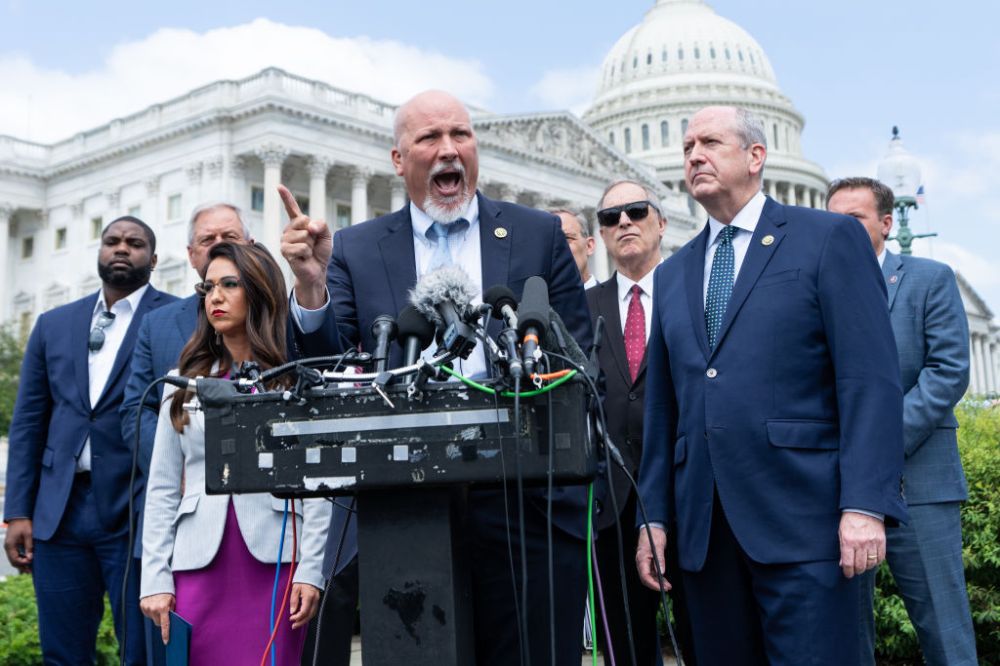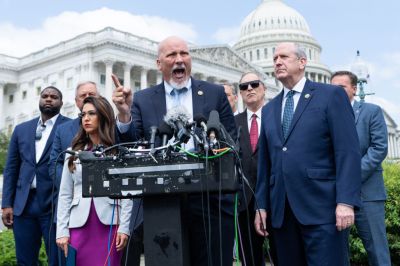House Speaker Kevin McCarthy’s deal with President Joe Biden over the weekend to suspend the debt ceiling until January 2025 has infuriated some conservative lawmakers. But whether the House Freedom Caucus or other hardliners will do anything about it remains to be seen.
“Democrats got everything they wanted with this bill,” claimed Rep. Ken Buck. And Rep. Lauren Boebert described it as “swamp garbage,” adding that voting for it would be “stabbing the American people directly in the back.” Texas Rep. Chip Roy, meanwhile, called it a “turd-sandwich” and pledged to rally opposition to the bill.
Republicans who disike the bill can of course vote against it when it comes to the floor this week. But they also have the power to force a vote on removing McCarthy as House speaker. So far only one member has publicly indicated he is willing to go that far.
A motion to vacate the chair—the procedural tool to oust the speaker—is on the table and appears “inescapable” to Rep. Dan Bishop of North Carolina, he said Tuesday. It takes just one member to offer the motion, but removing McCarthy requires a majority of members who are present and voting. They’d also likely have to sustain it past an initial vote; some moderate Democrats have privately suggested they would be willing to help McCarthy remain speaker amid blowback over a debt ceiling deal.
There are hints some other members are thinking about it: If Roy is unable to block the legislation this week, “We’re going to have to then regroup and figure out the whole leadership arrangement again,” Roy said Tuesday.
Others have pushed back on the idea. Rep. Andy Ogles, who repeatedly voted against McCarthy for speaker in January, said he doesn’t think a motion to vacate will happen.
At a press conference on Tuesday afternoon, Freedom Caucus members denounced the debt ceiling agreement but largely steered clear of throwing McCarthy’s leadership into question.
House Republicans are expected to huddle tonight to discuss the bill—kicking off an intense whip operation by GOP leaders, with a vote as soon as Wednesday.
It’s unclear how many Democrats will ultimately support the bill. House Minority Leader Hakeem Jeffries said on CBS over the weekend that he expects most support will come from Republicans, but some centrist Democrats have already indicated they would back it.
GOP leaders, meanwhile, are pushing back on the idea that McCarthy’s deal doesn’t go far enough to rein in spending. “The Fiscal Responsibility Act is true, transformative spending reform,” McCarthy argued in a Wall Street Journal op-ed last weekend.
McCarthy’s deal with Biden would cap non-defense discretionary spending at just below current levels for two years, although other provisions of the bill could offset those cuts. That means spending may stay roughly the same. The nonpartisan Congressional Budget Office hasn’t yet released an analysis of the legislation.
It’s a far cry from the debt ceiling bill Republicans passed in the House earlier this month, which would have cut discretionary spending by roughly $130 billion and imposed spending caps for a decade. It would have raised the debt ceiling only through March 2024, offering Republicans another chance to demand concessions from Democrats in this session of Congress.
As my Morning Dispatch colleagues wrote this morning, McCarthy’s deal would claw back $28 billion in unspent coronavirus relief funding, a longtime GOP priority. It would also repurpose roughly $21 billion from $80 billion in recently passed funding for the Internal Revenue Service and expedite approval of a 303-mile natural gas pipeline that would stretch from West Virginia to southern Virginia. The bill would expand work requirements for supplemental food assistance, increasing the age limit for the requirements from 50 years old to 54 years old for able-bodied adults.
The legislation is facing its first big hurdle this afternoon, as the House Rules Committee meets to debate it and set parameters for floor consideration.
Two far-right members of the Rules panel—Roy and Rep. Ralph Norman—have made clear they oppose the bill. But Rep. Thomas Massie, a Kentuckian with a libertarian streak, hasn’t been as critical of the legislation and may be willing to send it out of committee and to the full House. He told The Dispatch earlier this year that it’s “not my goal to be on the Rules Committee and to stop everything that I don’t like,” and he is prepared to support legislation in the committee even if he opposes its final passage.
Those three members joined the Rules Committee after McCarthy’s marathon speakership race in January, a concession McCarthy made to win conservative support. GOP leaders could theoretically advance the bill through Rules over the opposition of some Republicans and even potentially with some Democratic votes, but that may stir up new strife in the GOP.
Roy said on Monday that McCarthy explicitly agreed in their January speakership negotiations that nothing would pass the Rules Committee without at least seven of the GOP’s nine votes on the panel—and that the committee would not allow reporting out rules without unanimous Republican votes.
But other members have questioned the veracity of Roy’s claim, pointing out it’s not in official House rules and McCarthy didn’t tell them about any such promise at the time. A spokesman for Roy did not respond to The Dispatch’s questions about whether the pact he described is in writing elsewhere.
For now, the clock is ticking. Lawmakers had initially anticipated a June 1 default deadline—one they were set to blow past last week—but on Friday Treasury Secretary Janet Yellen revised the department’s estimate to June 5, buying members more time to push the bill through both chambers.
On the Floor
The House is set to vote on McCarthy’s debt ceiling legislation. A full list of other bills the chamber may consider this week is available here.
The Senate is considering judicial nominees, with initial action on the debt ceiling bill expected later in the week.
Key Hearings
- Officials from the Treasury Department and Department of Commerce will appear before a Senate banking panel hearing Wednesday morning to discuss how to counter China. Information and livestream here.
- The Senate Judiciary Committee will meet Wednesday morning for a hearing on immigrant workers. Information and livestream here.
- The Senate Foreign Relations Committee will meet Wednesday afternoon to examine Russian war crimes and atrocities in Ukraine. Information and livestream here.






Please note that we at The Dispatch hold ourselves, our work, and our commenters to a higher standard than other places on the internet. We welcome comments that foster genuine debate or discussion—including comments critical of us or our work—but responses that include ad hominem attacks on fellow Dispatch members or are intended to stoke fear and anger may be moderated.
With your membership, you only have the ability to comment on The Morning Dispatch articles. Consider upgrading to join the conversation everywhere.